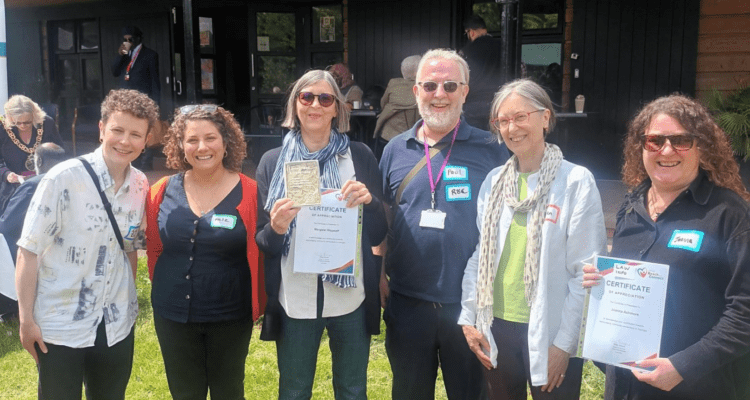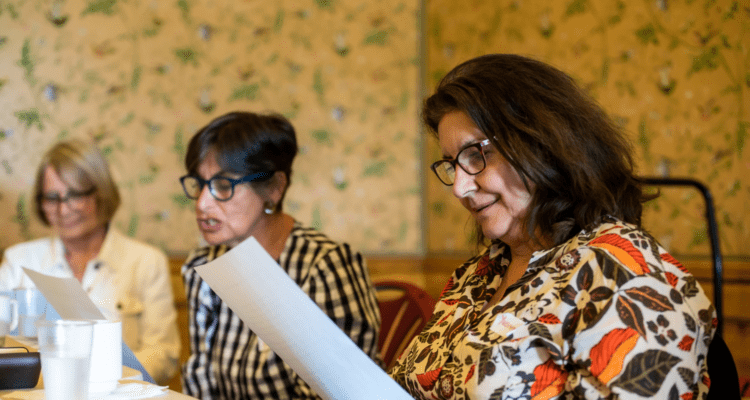The Reader Organisation’s National Conference 2012
It’s hard to believe that just one week ago everyone here at The Reader Organisation, along with over 150 delegates, were in the full throes of two-day National Conference at the British Library in London. Judging from the reaction from staff, guests, and speakers alike, the event was a resounding success. Keep an eye on the blog for more information about the issues covered in our breakout sessions, as well as moving testimonials from Get Into Reading group members, but here is a little flavour of what took place each day:
Day 1: Reading to Live Well
 Reading really does make you feel better, especially when it’s shared, and one of the main purposes of Day 1 was to explore this topic with a variety of professionals from public, private, and third sector organisations. Our Get Into Reading groups read aloud together in places ranging from care homes, GP surgeries, libraries, schools, community centres, in-patient mental healthcare settings, and prisons, improving wellbeing and providing stability, support, and a love of literature for their members. The day consisted of a mix of general plenary sessions complemented by breakout sessions focusing on a particular area of The Reader Organisation’s work.
Reading really does make you feel better, especially when it’s shared, and one of the main purposes of Day 1 was to explore this topic with a variety of professionals from public, private, and third sector organisations. Our Get Into Reading groups read aloud together in places ranging from care homes, GP surgeries, libraries, schools, community centres, in-patient mental healthcare settings, and prisons, improving wellbeing and providing stability, support, and a love of literature for their members. The day consisted of a mix of general plenary sessions complemented by breakout sessions focusing on a particular area of The Reader Organisation’s work.
Charlotte, Reader-in-Residence at Liverpool Hope University, highlights one of her top moments:
“'The Consequences of Reading’, in which TRO Director Jane Davis spoke to Professor Jonathan Rose about his book 'The Intellectual Life of the British Working Classes; was without a doubt one of my favourite parts of the first day of the conference. It was brilliant to see Jane in such enthusiastic conversation with a person who is clearly a personal hero of hers, and whose book has meant so much to her. I thought it was really important that the session felt like a conversation, and was fairly informal, rather than a typical ‘lecture’ or formal Q&A session.
As an English graduate myself, I found it incredibly interesting hearing Jonathan speak about his views on the responsibility of the academic to address the over-theoretical approach to literature in education environments in modern times. He commented that, 50 years ago, English was one of the most popular subjects at university, but that in recent times there has been a significant ‘falling-off’, and that he saw the cause of this to be the de-personalisation of literature, and lack of focus on the role of the reader. I was very interested by Jonathan’s comment that he saw it as his duty to put ‘the reader first and foremost in literary history: they are the one who gives the book individuality and agency – 'they make it do something.'
Towards the end of the conversation, Jane and Jonathan spoke about the fact that there is not much opportunity given to children in society now to listen to a story over a long period of time. ‘Story times’ in schools tend to focus more on short snatches of reading, in which the child is asked to look for specific things, and feed-back on afterwards. Jonathan commented that he saw it as incredibly important that we don’t necessarily ‘ask for something in return’ when we read to a child – that we should let the story wash over them, and sink-in over time.”
Our twitter hashtag for the Conference, #TRO2012, also prompted an enthusiastic response from the audience:
#TRO2012 if only every GP could see what Dr Iona Heath can see. (@TriciaCanning)
#TRO2012 Inspirational stuff yesterday & such enthusiastic staff, would love to see it rolled out in our organisation (@OT_LisaB)
#TRO2012 CRILS - Entertaining, informing and challenging - the best presentation by academics I have ever seen (@devonbiker)
The knowledge of the speakers and the passion displayed by everyone both on stage and off was truly inspirational. Exhausted, but elated, we geared up for Friday…
Day 2: Living to Read Well
This day was exclusively designed for people who had completed our Read to Lead training and are practising as Shared Reading Facilitators. Day 2 was therefore a combination of practical sessions on reading aloud and choosing material, problem solving and literary masterclasses. Equally valuable was the opportunity to meet and catch-up with other Shared Reading Facilitators from around the UK and beyond, providing encouragement and advice on this challenging but rewarding practice.

Credit Steve Wasserman, http://readmesomethingyoulove.com
Undoubtedly, the highlight of the day for many was Lemn Sissay in conversation with Jane Davis. An advocate for Looked After Children, young people with whom The Reader Organisation also works closely, he was by turns hilarious and heart-breaking, as Michael, our Events and Publications Intern, explains:
“There was a great deal of hype surrounding Lemn Sissay’s conversation with Jane. An expectant audience had heard a lot about this
charismatic writer and, I have to say, he didn’t disappoint. What could be added to Lemn’s already extensive list of job titles (including: poet, playwright, social commentator) is performer. His energy on stage kept us on the edge of our seats, whilst his anecdotes had us laughing and murmuring our agreement in equal amounts.
But what shone through most was Lemn’s passion for children and the effect great literature can have on their minds and their lives. ‘Books open up a free space inside a child’s imagination’, Lemn affirmed. He listed a number of characters from literature who were orphaned at a young age or who grew up in care – Oliver Twist, Harry Potter, Bruce Wayne, Jane Eyre – and argued that it is these characters that should be utilised more effectively to demonstrate to us all just how significant looked-after children are, and the important part they play in our society.”
Twitter was buzzing in response, once again:
Fabulously moving and funny Lemn Sissay
#TRO2012 (@HelenKielt)#TRO2012 what a day! What a day! What a day! What a day! (@RachelNiblock)
train home from
@thereaderorg#TRO2012 conference@britishlibrary - words not enough to voice my awe of the past two days. Amazing people.(@ajeastwood)
The impact the conference had on all of us here at The Reader Organisation itself was phenomenal - we were intellectually stimulated, re-energised and inspired, and hope you were too. The Twitter hashtag is still live, so please continue to voice your thoughts online @thereaderorg.
There’ll be more on the blog in the coming weeks, but in the meantime, roll on 2013…
Share
Related Articles

July’s Monthly Stories and Poems
We are continuing to take inspiration from The Reader Bookshelf for 2024-25 with the theme for July’s Monthly Stories and…

Celebrating Our Haringey Volunteers
On 7th June, we joined several Voluntary and Community Sector organisations and volunteers in Haringey outside the pavilion in the…

Could you volunteer to lead Shared Reading groups to support wellbeing of Asylum Seekers and Refugees?
We're launching an innovative new project in Halton for refugees and asylum seekers with an ESOL (English for Speakers of…




8 thoughts on “The Reader Organisation’s National Conference 2012”
[…] been nearly three weeks since the immensely inspiring and highly enjoyable Reader Organisation 2012 Conference in London, and here at TRO we’re all still buzzing from the effects (the jubilation is added to with […]
[…] of the most inspiring features of The Reader Organisation’s recent national conference at the British Library was the testimonials from Get Into Reading group members and volunteers. For […]
[…] in our series of Get Into Reading group members’ testimonials, originally presented at our conference in […]
[…] of years, and found it to be a life-line during difficult times. She first told her story at our National Conference, so we’ve posted it here for those of you who missed it first time […]
[…] the very intriguing Spark Catchers, the poem written especially for London 2012 by TRO patron and 2012 Conference guest speaker Lemn Sissay. It certainly sparked off some interesting thoughts and discussion (and […]
[…] I was first taken to the Bibliotheca Alexandrina, one of the largest libraries in the world and certainly the most gargantuan and impressive of buildings that I had ever seen. The library was built as a replacement to the Ancient Library of Alexandria, destroyed in part during the Alexandria War of 48 BC. Housing an enormous collection of works in Arabic, French and English, the architecture of the modern library is breath-taking, with marvellous fountains in the grounds, a spacious and high-tech interior and a glass roof which slopes downwards towards the Mediterranean Sea. Walking through the endless aisles of books, I felt lost in a sea of literature whose inherent value was overwhelming. The layout of the building is open-plan with an angled floor which, if standing at the top, gives you the unusual feeling of looking down on something both extremely special and yet readily accessible. The mixture of people visiting the library, from tourists visiting from across the globe, to local students and businesspeople, gave it an extremely vibrant feel, similar to that of the British Library in London, location of The Reader Organisation’s National Conference 2012. […]
[…] annual conference, ‘Reading to Live Well’, was held in May at the British Library in London. Speakers included Dr Iona Heath, President of […]
[…] of improving the lives of Looked After Children through literature, something he spoke about at our 2012 Annual Conference. Join Lemn, official poet of the London 2012 Olympics, as he talks about his life and reads from […]